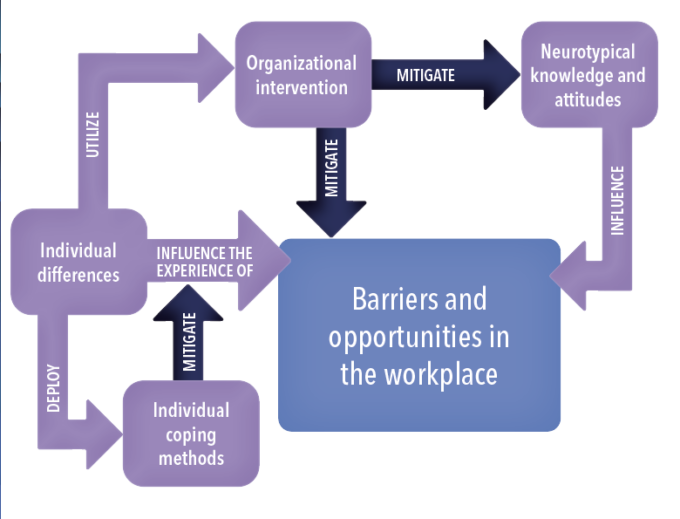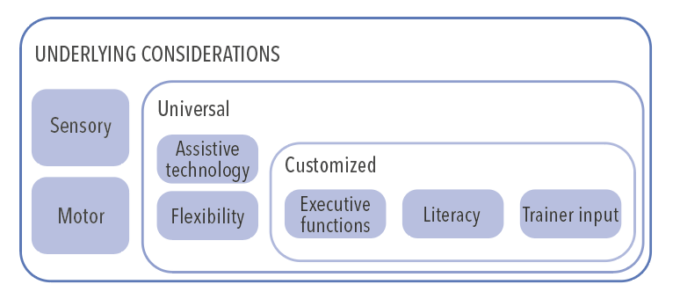
Scared of retirement? You don’t have to be
Research-backed insights reveal the hidden challenges leaders face when transitioning from career to retirement, and what organizations must do to support this critical life change. ...

Published November 6, 2024 in Talent • 7 min read • 
When workplaces are flexible and supportive, neurodivergent employees can more easily turn potential challenges into opportunities for success.
Workplaces are often compared to ecosystems, but what does that mean?
When we talk about an organizational ecosystem, we picture a dynamic environment packed with different human types, each contributing their strengths and quirks to the balance and success of the enterprise. Among these differences, neurodivergence (variations in cognitive functioning) presents unique challenges and opportunities. But navigating this environment isn’t easy, especially when barriers block almost every path.
Individual success within such an ecosystem, particularly for neurodivergent employees, often hinges on how well their coping mechanisms are understood and supported by organizational interventions. This is where Hala Annabi and Sarah Lebovitz’s theoretical Organizational Interventions Mitigating Individual Barriers (OIMIB) framework leaps in, offering insights into how organizations can mitigate individual barriers and enhance opportunities for neurodivergent employees. It’s time we put these insights to work, making the workplace not just manageable but a productive and resourceful environment for everyone.
Differences in the workplace encompass a range of factors, including cognitive styles, communication preferences, emotional responses, and behavioral patterns. Picture this: you’re in a meeting, and while one colleague is meticulously scribbling notes, another is staring out the window, lost in thought but likely solving a complex problem in their head. These individual differences in how we think, communicate, and cope make the workplace vibrant, though sometimes chaotic. For neurodivergent individuals, these differences are often more pronounced and can lead to distinct experiences of barriers and opportunities within the workplace, making it essential to recognize and accommodate them.

Neurodivergent individuals often develop coping mechanisms to navigate environments that weren’t designed with their needs in mind. Whether wearing noise-canceling headphones to mute office chatter, using visual organizers to keep tasks in check, or finding creative solutions to problems, these strategies are their tools for managing day-to-day work. However, just like an architect needs the right blueprints and materials to bring a vision to life, these coping mechanisms are most effective when supported by the organization. The success of these strategies depends heavily on the work environment. When workplaces are flexible and supportive, neurodivergent employees can more easily turn potential challenges into opportunities for success.
One key takeaway from the OIMIB framework is that organizations should treat their interventions like a work in progress, constantly assessing and adapting to keep things effective and relevant. After all, the workplace is a dynamic environment, and what works today might need a tweak tomorrow. By staying responsive to the evolving needs of neurodivergent employees, organizations can ensure their programs remain effective and supportive.
Annabi and Lebovitz’s framework is like a cheat code for organizations looking to support neurodivergent employees. Instead of expecting employees constantly to adapt to a one-size-fits-all work environment, it suggests that organizations should take proactive steps to reduce barriers. Think of it as switching course from “impossible” to “challenging but achievable”. Organizational interventions can take many forms, including:
Open offices are like a minefield for sensory overload. By adjusting the physical workspace to reduce distractions, such as offering quiet zones or flexible seating, organizations can help neurodivergent employees focus and improve productivity without feeling like they’re battling a sensory tsunami.
Allowing flexible work hours, remote work options, and individualized task assignments can enable neurodivergent employees to work in ways that align with their cognitive strengths and personal needs. Not everyone thrives on a standard nine-to-five schedule, particularly when managing cognitive differences that impact energy levels and focus. Flexible hours and remote work options aren’t just nice-to-haves; they’re game-changers for allowing neurodivergent employees to work when they’re at their best.
Ever feel like you’re playing a game of Chinese whispers? For neurodivergent individuals, providing clear, direct communication, offering alternative communication channels, and training managers to recognize and adapt to different communication styles can be the difference between collaboration and confusion.
You wouldn’t navigate a busy city without a map. Similarly, educating all employees about neurodiversity and inclusive practices equips everyone with the knowledge they need to navigate this diverse ecosystem with confidence and empathy.
Neurodivergent employees may need a different path to get up to speed, but once there, they’re unstoppable. Tailoring onboarding processes and professional development programs to the needs of these employees ensures that they’re not just surviving but thriving.
This is easier said than done. So, where to begin? Here’s a simple model to help you kick off, organize, and connect all the elements, enabling a strategy that is both effective and comprehensive.

Nancy Doyle, founder and owner of Genius Within, a social enterprise dedicated to facilitating neurodiversity inclusion, has identified key areas where workplaces can adjust to support neurodivergent employees, such as assistive technology, flexible work schedules, and coaching for skills like memory and time management. We can take this a step further and group these into two categories: “universal adjustments”, like technology and flexibility, which can be applied broadly, and “customized adjustments”, like specific coaching and training, which need to be tailored to individual needs. What drives these adjustments is the need to align them with sensory sensitivities, attentional challenges, and/or motor functioning; factors that often overlap across many neurodivergences to varying degrees – for example, creating quiet zones for sound sensitivity, providing ergonomic tools for fine motor difficulties, or offering tools like task timers to support focus.
Think of these programs as the key to unlocking the potential of neurodivergent employees to overcome barriers and seize opportunities.
By focusing on what neurodivergent employees excel at, organizations can align job roles with individual strengths. For example, an employee with a knack for detail might be ideal for tasks requiring meticulous data analysis or quality control. This alignment boosts productivity and makes employees feel more valued and satisfied.
Programs such as mentorship, coaching, and peer networks act as a GPS, guiding neurodivergent employees through the twists and turns of workplace challenges. These resources help them develop new coping strategies, build confidence, and advance their careers.
Regular, constructive feedback functions like a well-tuned compass, helping neurodivergent employees understand their performance, identify areas for growth, and celebrate their achievements. It also allows managers to step in early, addressing potential barriers and making necessary adjustments to support the employee’s success.
The goal isn’t to make neurodivergent employees jump through hoops to prove their worth; it’s to create an environment where they can shine.

While organizational adjustments are essential and a core expectation, it’s equally important to recognize that individual accountability plays a significant role in navigating workplace challenges. Neurodivergent individuals should be encouraged to develop and refine their coping mechanisms, as these personal strategies are crucial for managing the challenges they encounter. However, these mechanisms alone are not enough. Imagine a tightrope walker without a safety net. It’s impressive but incredibly risky. That’s what it’s like for neurodivergent employees relying solely on their coping mechanisms without organizational support. The goal isn’t to make neurodivergent employees jump through hoops to prove their worth; it’s to create an environment where they can shine.
The key is balance. Employment programs should act as that safety net, allowing employees to use their coping strategies without constantly feeling one step away from falling. For example, an employee with social anxiety might have an excellent coping mechanism for handling one-on-one interactions, but what happens when they’re thrown into a large team meeting? Their coping strategy might falter without ample time to prepare and alternative meeting formats, like virtual tools or smaller group discussions. However, they can navigate these situations with confidence with the right organizational support.
While organizations must create environments that support neurodivergent employees, individuals must also take proactive steps to understand their needs and develop strategies that work for them. This includes seeking out resources, practicing self-advocacy, and continuously refining their coping mechanisms to meet evolving workplace demands.
Here are some actionable steps neurodivergent employees can take to build and refine their coping mechanisms:
Example: Recognize specific triggers, such as bright lights, and consider adjustments like using desk lamps or requesting a workspace with natural light.
Action: Keep a journal to track stressful situations, noting triggers and effective strategies, like working in a quieter space.
Example: If large meetings are challenging, discuss alternatives with your manager, such as contributing through written reports.
Action: Schedule regular one-on-one check-ins with your manager to discuss challenges and propose solutions, like rotating meeting formats.
Example: If managing deadlines is tough, attend time management workshops or use tools like Trello.
Action: To enhance productivity, research and request specific tools or software, such as task reminder apps or ergonomic equipment.
Example: If open-plan offices are overwhelming, request noise-canceling headphones or a flexible work arrangement.
Action: Prepare a list of accommodations that would improve your performance and present them to HR with clear benefits.
Example: As job roles evolve, adapt coping strategies by exploring new tools for collaboration.
Action: Regularly evaluate and update your coping mechanisms, experimenting with new approaches to ensure they stay effective.
The sweet spot is a partnership where neither the organization nor the individual is left shouldering the burden alone. Instead, both sides are engaged in creating a supportive and inclusive environment. Organizational interventions should enhance and amplify individual coping strategies, making the workplace a stage where neurodivergent employees can shine.

Accelerate your career with strategic business capabilities and transformative leadership skills.

September 5, 2025 in Talent
Research-backed insights reveal the hidden challenges leaders face when transitioning from career to retirement, and what organizations must do to support this critical life change. ...

August 14, 2025 • by Zoë Falquet in Talent
Zoë Falquet, Sustainability Director at International Petroleum Corporation, reflects on how an unplanned path and a conviction to lead from within helped shape her ESG leadership journey. ...

August 13, 2025 in Talent
McArthurGlen is redefining HR by prioritizing employee wellbeing while staying laser-focused on commercial impact. From flexible wellness benefits and peer support networks to data-driven engagement strategies, the company is showing how people-first...

August 4, 2025 • by Tomoko Yokoi in Talent
According to Tomoko Yokoi of IMD, knowledge scientists may hold the key to unlocking AI's full worth by providing transparency and structure that data scientists alone cannot deliver....
Explore first person business intelligence from top minds curated for a global executive audience